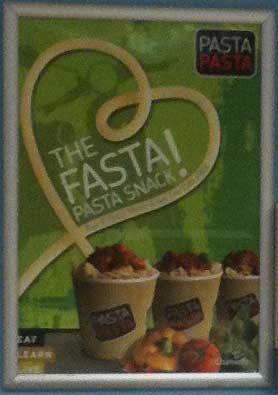Tedium is the mother of invention
Boring lunchtime seminar?
Want to distract yourself, but forgot your notepad?
No problem. Just borrow a pen.
My illustrious colleague Dr X shows you how:

Boring lunchtime seminar?
Want to distract yourself, but forgot your notepad?
No problem. Just borrow a pen.
My illustrious colleague Dr X shows you how:


>gi|geeky_picture|gb|silliness| Poster hanging on wall of university refectory
FASTAPASTATHEBREAKFASTOFBIOINFORMATICIANS
Lost? All is revealed.

You know you’re a hopeless geek when…
…you get served an onion ring like this, and all you can think about is bacterial plasmid replication forks.
It’s holiday time. Yesterday I finished up my work in the lab, put my cells to bed, cleaned off my desk and headed down to South Kensington for jazz and cocktails with the Labliterati. On Monday, I’m off for an entire week.
It’s always a strange feeling, taking time away from the lab. You get into these rhythms — piling on the experiments until you hardly have time to eat, sit down or take comfort breaks. Their sudden absence is a shock to the system.
But I’m not complaining. We’ll be camping near the North Devon shore. I’ve got two books to read for Fiction Lab: Einstein’s Dreams by Alan Lightman and State of Wonder by Ann Patchett. I’m bringing my fly fishing tackle, a notebook for musing about Novel 4 (which is three chapters in but in need of some advanced sub-plotting), a few decks of cards. Maybe my sketchpad and pencils.
I’m sure my cells will be fine without me.
You know it’s time to wrap up your post-doctoral stint when your hard-drive is full.
I’ve been in this lab a bit more than four years, having bought a MacBook Pro soon after my arrival. This morning, I tried to perform a software update and was informed that the start-up disk did not contain enough room.
I think this is a fitting metaphor for something.
There is a wonderfully helpful spirit in the scientific community, especially when it comes to sharing reagents and tools. If one lab develops something handy and publishes it in a paper, interested readers need only to drop an email to the lab head and request a sample for their own experiments. (In fact, most journals deem such assistance mandatory, though I don’t think your average researcher needs threats as an incentive to share the love.)
While sometimes such requests fall on deaf ears, in my experience, being ignored or fobbed off is rare. So if everyone is all friendly and touchy-feely about providing stuff promptly, how then can we measure relative kindness?
Clearly, some help is more helpful than others. When it comes to plasmid DNA, it is relatively straightforward for a researcher to make copies from a tiny, forensic amount of the original. Because of this, it’s become trendy in recent years to send out DNA, not in a goodly amount in a tube, but as spots dried onto a piece of filter paper. This spot can be rehydrated and zapped into E. coli bacteria, which will create copies of the plasmid which you can then liberate from the bugs in large quantities.
No big deal, right? But it does take at least two days, and a few hours of your life manipulating bugs, plates and columns at your bench. Whereas if someone sends you a lovely big wodge of DNA, and you only want to do an experiment a few times, you’d be able to perform it straightaway without faffing around with the cloning step.
Earlier this week, I requested a plasmid from a very big, very famous American lab. I was charmed that the professor answered personally, on the same day he received the email, and that he immediately instructed his post-doc to send it out. I was further charmed by the friendliness of the post-doc, who emailed to say he’d sent it Fedex that very same day.
It had not escaped my notice, though, that if the plasmid arrived today, and there was a goodly amount, I could perform my experiment this afternoon and have slides ready on Monday, which in turn could be imaged and analyzed before I went on holiday that coming weekend – giving me a significant edge on my paper revision deadline. I wouldn’t dare have asked for more than a dried spot, but I was sort of hoping the post-doc would sense my desperate, fellow-post-doc-angst vibes across the many miles between us.
And so it was that the Fedex package arrived. And I knew immediately how the DNA had been sent — the package was flat as a pancake. I fondled it optimistically, but there was definitely no tube in there, not even one of those weeny PCR-sized tubes.
Ah well, I thought philosophically as I roused the bugs from their dormant sleep in the -70 freezer. It’s definitely possible to be too greedy. The lab in question probably sends out hundreds of plasmids a week, and it’s just not practical to feed the five thousand. In fact, the post-doc was doing me a favor: I have way too much on on Monday, and another experiment probably would have tipped the balance.
Besides, I like bacterial work: it reminds me of my lost youth as a bona fide microbiologist.
So let’s hear it for the kindness of strangers, something that definitely makes the scientific world go round.

So a few of us were sitting around waiting for the weekly departmental seminar to kick off this afternoon, and we got to talking about nerves. After all, giving a public talk can be a stressful experience, as your research is put at the mercy of an often hostile audience.
A post-doc in our lab was giving the first talk, and I told him he was lucky because our supervisor is out of town.
“Shouldn’t that be more stressful?” he asked.
Well, not to me. I explained that when you’re talking about your research and the boss isn’t in the room, you are by default the one who knows more about it than anyone else in the world. But if the boss is there, I am always aware of everything I say and somewhere, in the back of my mind, wondering whether it is passing muster – whether our world views on the data in question actually coincide.
“My boss has a ‘tell’,” offered one of the other post-docs who’d arrived early. “When you’re up at the podium and you say something not quite right, he does this –”
And she proceeded to demonstrate: hand creeping over eyes, hunched shoulders, a fatal shrinking in of her entire body.
“And if you don’t extract yourself correctly,” she added, “he starts fiddling with his socks.”
My colleague then recalled that our supervisor also has a ‘tell’: he leans back in his chair, tilts his head and raises his eyebrows to a rather non-committal elevation.
“On second thought,” he said, “Maybe it is a good thing he’s out of town.”
By Nik Papageorgiou.